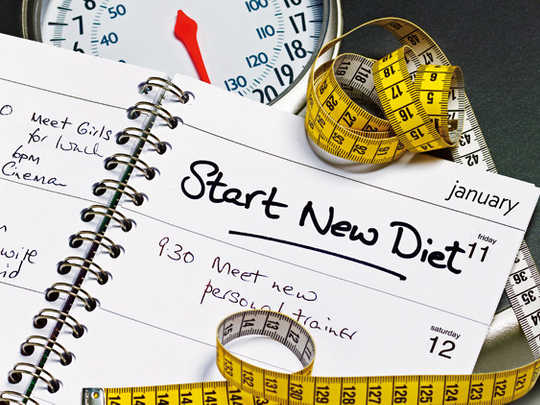
Diet disaster: Setting unrealistic goals
Potential risk: Having unrealistic expectations when it comes to losing weight means you're more likely to experience feelings of failure, and abandon your weightloss efforts. Most reputable health organisations, including the National Health Service in the UK, recommend an optimal weightloss rate of 0.5 to 1kg per week. Rapid weightloss of more than 1kg per week not only poses health risks such as vitamin and mineral deficiencies; it also increases the risk of regaining the weight in the long term.
What to do: Use the acronym SMART to help you set realistic weightloss targets by making sure your goals are Specific, Measurable, Attainable, Relevant and Time-bound.
Diet disaster: Too many liquid calories
Potential risk: Beverages are one of the biggest sources of hidden calories in a person's diet. According to study findings published in The International Journal of Obesity, calories from beverages can have a bigger impact on body weight than calories from food because they are less satisfying. Researchers found that when people were given 450 extra calories worth of either candy or soda every day for four weeks, those eating the candy reduced their calorie consumption from other sources to compensate, whereas people drinking the soda made no such changes to their diet. At the end of the study those drinking the soda had gained considerably more weight than the participants eating the candy.
What to do: Skip the calorie-laden beverages, such as soda, energy drinks and sweetened fruit juice, and instead opt for naturally calorie-free options, such as water, herbal tea and plain coffee.
Diet disaster: Skipping breakfast
Potential risk: If your efforts to cut calories include skipping meals - typically breakfast - you may want to think again. Breakfast helps stabilise blood-sugar levels and controls appetite throughout the day. Skipping the morning meal often means overcompensating for those missed calories at lunch and dinner. Studies consistently show that breakfast eaters are less likely to be overweight compared with non-breakfast eaters. In fact, one study published in The American Journal of Clinical Nutrition found that people who consistently skip breakfast in both childhood and adulthood have waists that are, on average, 5cm larger than people who always eat breakfast.
What to do: The American Dietetic Association recommends using three building blocks for a healthy breakfast; a source of protein, such as eggs, beans or dairy; a wholegrain, such as oatmeal; and fresh fruit, such as apples, berries or melon.
Diet disaster: Add-ons that add up
Potential risk: That extra drizzle of dressing on a garden salad, or dollop of sour cream on a baked potato may seem innocent enough, but calories from condiments can add up very quickly. Per tablespoon, you will find up to 80 calories in salad dressing, 100 calories in mayonnaise, 65 calories in honey, 103 calories in butter, 92 calories in peanut butter and 120 calories in olive oil.
What to do: Add zest to dishes without adding a lot of extra calories by using leaner condiments and seasonings, including salsa, horseradish, balsamic vinegar, hot sauce, lemon juice, fresh herbs and dried spices.
Diet disaster: Oversized portions of healthy food
Potential risk: Portion size is one of the golden rules of healthy eating. And while controlling portion size is especially important for unhealthy foods, such as chips, cake and soda, it's also important for healthy foods. Whether you're eating a fresh salad or a burger with French fries, portion size matters. Calories are the currency of weightloss, and extra calories in any form can sabotage your efforts.
What to do: Take the guesswork out of correct portion sizes by using the plate model when eating meals; fill half of your plate with fruits and vegetables; a quarter of your plate with wholegrains, such as brown rice or quinoa; and the remaining quarter of your plate with lean protein, such as chicken, fish or meat.
Diet disaster: Overeating distractions
Potential risk: Distractions not only extend to the amount of time you're actually eating, they also make it harder to keep track of how much you've eaten. One study, conducted by researchers at Cornell University in the US, found that the more time study participants spent watching TV, the more they ate. In fact, researchers found that when people watched TV for an hour, they ate 28 per cent more popcorn than if they watched the TV for just half an hour.
What to do: Make meal times purely about meals by ditching the distractions, such as the TV, computer or mobile phone. Bring awareness to your meal by focusing on the taste and texture of your food, and get in the habit of eating at the table, instead of on the couch, at your desk or in bed.
Diet disaster: Not enough water
Potential risk: Falling short on your water intake can cause a sluggish metabolism, which means slower weightloss. What's more, research shows that drinking water before meals can actually increase weightloss by reducing feelings of hunger. One study published in the journal Obesity found that dieters who drank just two glasses of water before every meal for 12 weeks lost almost 50 per cent more weight than dieters who didn't drink any water before meals.
What to do: Get into the habit of carrying a reusable water bottle around with you during the day. This will help you boost your fluid intake before, after and between meals.
Diet disaster: Not eating enough (or often enough)
Potential risk: Cutting too many calories, as is the case with many fad diets, is actually counterproductive when it comes to losing weight. Consuming too few calories causes the body to slow its metabolism down in order to conserve energy and keep itself functioning properly; as a result you actually burn fewer calories.
What to do: According to Dietitians of Canada, it's not just what you eat, but how often and how much that makes a difference to weightloss. They recommend having a meal or snack every three to four hours - this will both help control your appetite and help you stay energised.
Diet disaster: Avoiding exercise
Potential risk: Cutting calories from your diet is only one half of the weightloss equation. Studies show that many people who lose weight without exercise often regain it in the long term. Research findings from The National Weight Control Registry in the US (an ongoing study that tracks adults who have lost at least 15kg and kept it off for more than a year) show that 90 per cent of people who have successfully maintained their weightloss exercise on a daily basis.
What to do: The World Health Organisation recommends adults accumulate at least 150 minutes of moderate-intensity physical activity each week. For additional health benefits, they recommend bumping up your workouts to 300 minutes per week.
Diet disaster: Underestimating calories
Potential risk: Sure, you're sticking to three healthy meals a day, but what about all those other calories that sneak in throughout the day? A few dates here, a couple of biscuits there; research shows that people consistently underestimate how much they eat in a day. One study, published in The New England Journal of Medicine, found that obese adults under-reported their food intake by 47 per cent and over-reported their physical activity by 51 per cent. These differences add up over time and can thwart even the best weightloss efforts.
What to do: Keeping a daily food diary is an excellent, and effective way to keep track of how much you're eating. One study, published in the American Journal of Preventive Medicine, found that dieters who wrote down what they ate every day lost twice as much weight as those who kept records for just one day a week or less often. For best results, you should record the time, what you ate, the quantity and how you were feeling when you ate it. The brilliant new book and journal set Younger Next Year for Women by Chris Crowley and Henry S Lodge (Workman Publishers) not only gives you tips on how - through diet, exercise and lifestyle changes - you can live healthier for longer, but it also provides you with a journal for lifestyle record-keeping. The 52-week, fill-in book boasts detailed prompts to help you keep track of your diet, workouts and moods, "because writing things down can make a difference," says Henry S Lodge.











